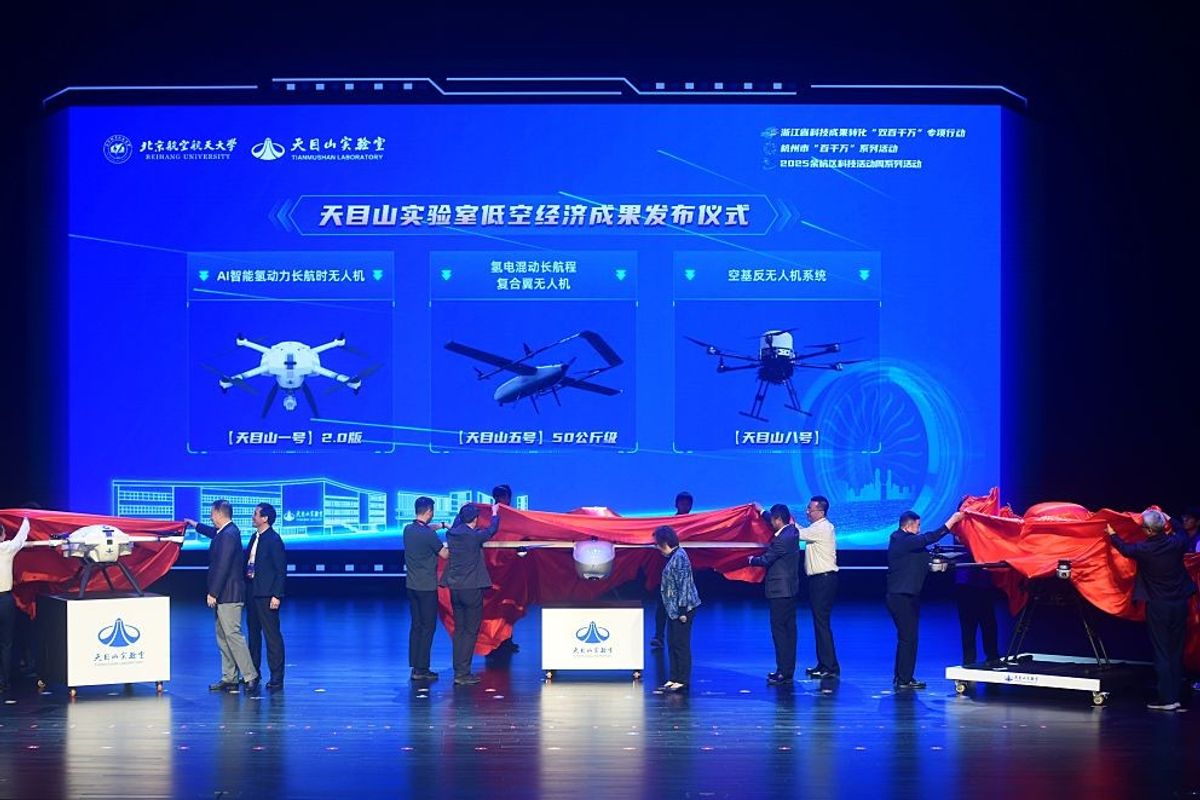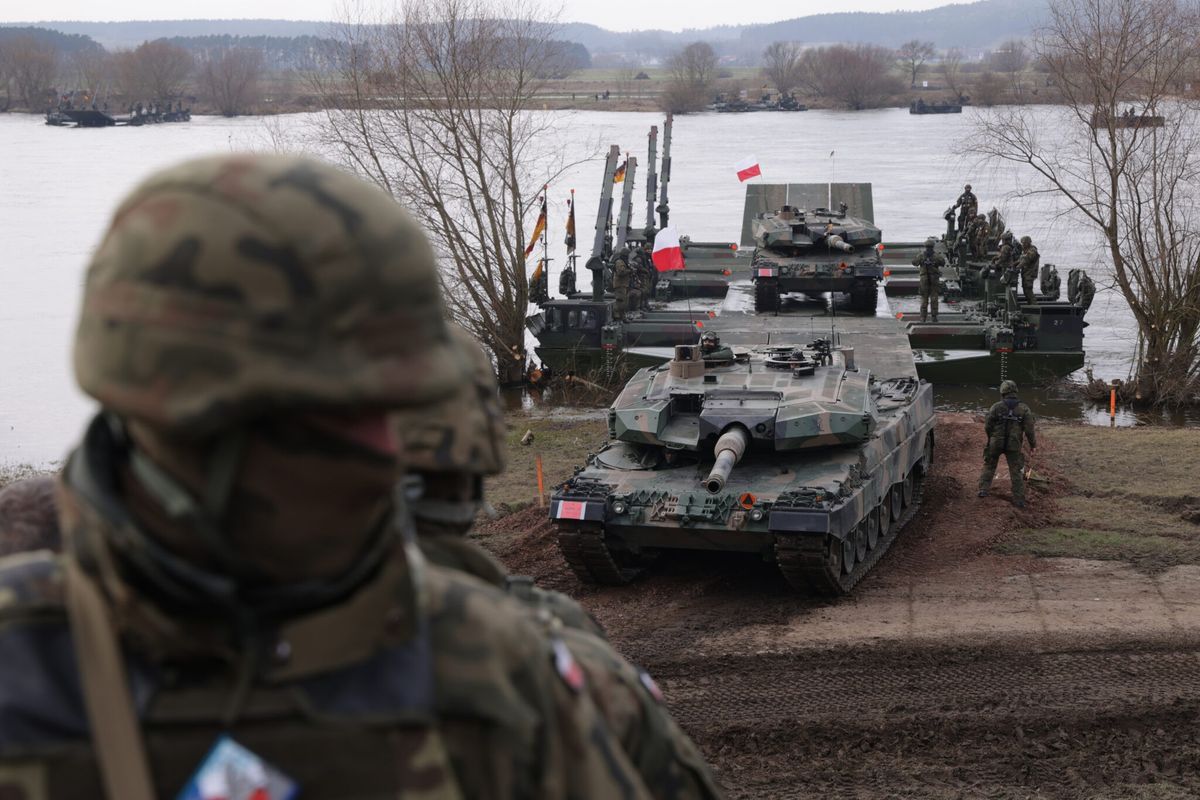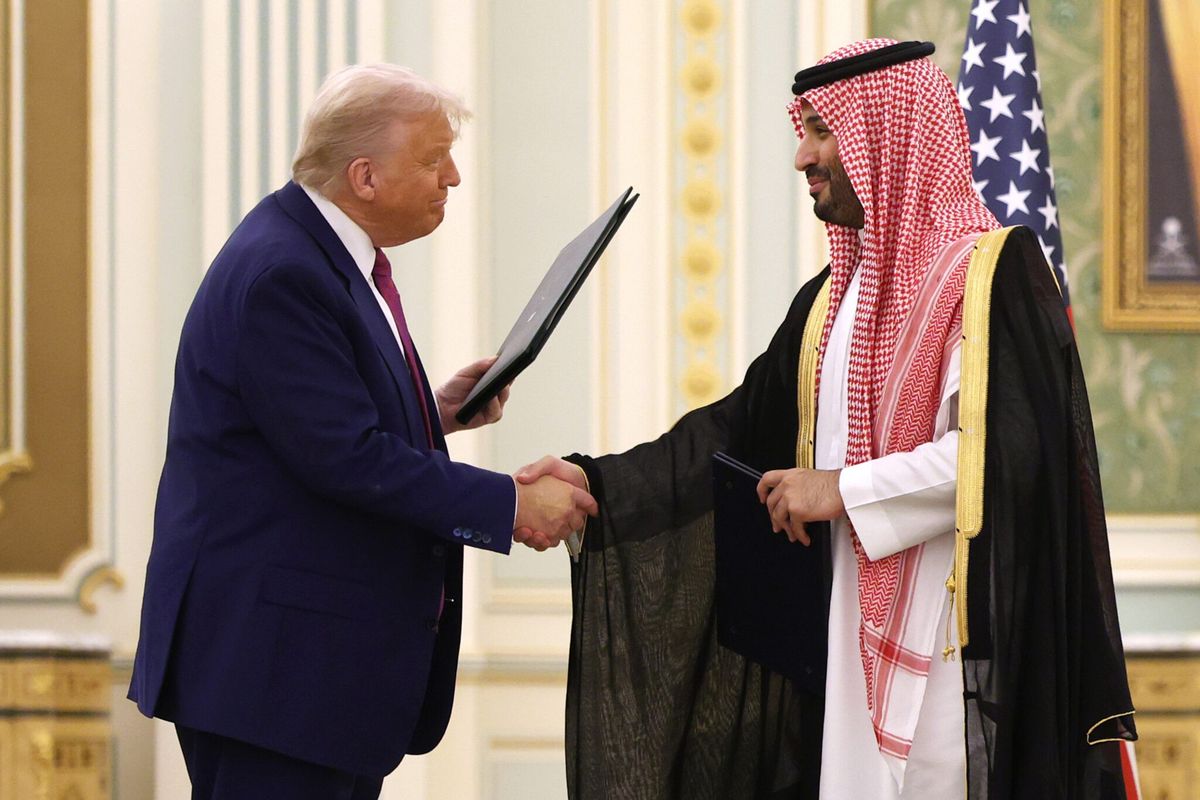DEEP DIVE - As Donald Trump prepares to return to the White House, the U.S. faces an unusually broad set of global security challenges: wars in Europe and the Middle East, neither of which look likely to end before Inauguration Day; a tense relationship with China and the possibility of conflict over Taiwan; and an increasingly potent and coordinated group of adversaries – what many have called an “axis of authoritarians” – working to counter the U.S. and the West. Also in the mix are foreign disinformation campaigns, cyberattacks against the U.S., and a threat of terrorism which has risen to “a whole other level,” as FBI Director Christopher Wray has put it, inspired largely by Israel’s war in Gaza.
“The global security challenges that the U.S. faces…we haven’t seen anything quite like this since World War II,” General Jack Keane, a Cipher Brief expert and former Vice Chief of Staff of the U.S. Army, said at a security conference earlier this year.
How will the Trump-Vance administration deal with these issues? In some areas, the president-elect has offered clues. Trump has criticized U.S. aid to Ukraine, and vowed repeatedly to resolve the conflict there (within 24 hours of taking office, he has said). He has sent mixed signals on the wars in the Middle East, promising to end those as well, while also indicating he will let Israel do as it wishes in Gaza and Lebanon. On Taiwan, the record has been a mix of staunch support and criticism of the island.
In a general sense, Trump’s “America First” world view suggests a more isolationist approach; during his first term and his recent candidacy, he questioned longtime U.S. alliances in Europe and Asia, and boasted of his close relations with several global autocrats.
In a post-election piece titled “Welcome to Trump’s world,” The Economist warned that Trump’s return would herald an “open season for bullies” on the world stage. “Countries will be more able to browbeat their neighbors, economically and militarily, without fear of consequences,” it said. “Their victims, unable to turn to America for relief, will be more likely to compromise or capitulate.”
That may be, but Trump is also famously unpredictable, and some experts believe that quality might help him navigate the more difficult issues.
“The very fact of Trump’s return to power will – because of his unpredictable nature – help with this,” Mark Kelton, a former CIA Senior Executive Service Officer, told The Cipher Brief. “He will be able to instill uncertainty and a degree of fear in our adversaries that is not currently present.”
The Cipher Brief reviewed the record – actions taken during Trump’s first term, and statements and pledges he and his team have made during the campaign – for an assessment of how a Trump-Vance administration might address the global flashpoints of the moment.
Nightmare for Ukraine – or pleasant surprise?
No country had more riding on the U.S. election than Ukraine.
Writing on X just five days before the vote, Ukrainian President Volodymyr Zelensky said: “The next U.S. president may strengthen or weaken support for Ukraine. If that support weakens, Russia will seize more territory, it would prevent us from winning this war. That is the reality.”
In the wake of Trump’s victory, Ukrainians have many reasons to worry. Trump has mocked Zelensky and boasted of a warm relationship with Russian President Vladimir Putin. He has called Putin “savvy” and a “genius,” and as president, Trump famously stood by Putin’s version of events against the U.S. intelligence community’s claims of Russian election interference. Trump’s vows to quickly end the war and the shipments of U.S. aid – especially given recent Russian battlefield gains – look to many Ukrainians like a recipe for disaster.
Since Tuesday's election, Zelensky has tried to thread a needle: effusive praise for Trump, while urging him to reconsider. In a congratulatory message and a conversation with the president-elect, Zelensky praised Trump for a “peace through strength” approach to global affairs, but stressed the need for a “just peace” and “a fair ending” rather than a “fast ending” to the war.
“If it's just fast, it means losses for Ukraine,” Zelensky told reporters Thursday. “I don't yet understand how this could be any other way. Maybe we do not know something.”
Zelensky’s best hope may be Trump’s unpredictability – the possibility that the president-elect won’t want to be seen as weak next to Putin, and that the promised rushed deal and aid cutoff won’t happen. Zelensky is no doubt aware that competing Ukraine policies have been put forward by Trump surrogates: J.D. Vance, the vice president-elect, outlined a deal that might have been drafted by the Kremlin – including Russian control of territory it has captured, and a guarantee that Ukraine will never join NATO. The other proposal came from Trump’s former secretary of state, Mike Pompeo, in the Wall Street Journal. Pompeo’s version features continued American support for Kyiv to deter Russian aggression, and leaves open the possibility of future NATO membership for Ukraine. The latter would of course be a pleasant surprise for Zelensky.
The Ukrainian leader was reportedly buoyed somewhat by the call with Trump, which was joined by Tesla CEO and Trump ally Elon Musk. Musk pledged to continue to provide Ukraine his SpaceX Starlink satellites, which have been critical for Ukraine’s military. Sources said the Musk-Trump call “didn’t leave Zelensky with a feeling of despair.”
As Brian Bonner reported for The Cipher Brief earlier this week, some Ukrainians are warily optimistic about Trump’s promise of a quick end to the war, for the simple reason that they are so weary of the fighting. While 55 percent of Ukrainians remain opposed to any territorial concessions to Moscow, that figure has fallen in recent months. Meanwhile, there are many Ukrainians who, while appreciative of American support – an estimated $64.1 billion to date – have viewed the Biden administration’s policy as overly timid and lacking a strategy for victory.
Several Cipher Brief experts have argued that continued U.S. support isn’t just critical for Ukraine; it's also essential for European security and for the message it sends to China.
At last month’s Cipher Brief Threat Conference, former CIA Director General David Petraeus said, “If you don’t support your Ukrainian partners…Why in the world would [China’s] President Xi [Jinping] think that you're going to come to the aid of Taiwan?”
China and Taiwan: Mixed messages
The Biden and Trump national security teams agreed on this much: The great global challenge for the United States – the “pacing threat,” as many officials have put it – is strategic and economic competition with China.
Trump implemented tarrifs against China during his first term that were broadened under the Biden Administration. Now Trump plans a sharp escalation.
“China is bracing for a trade war,” David Pierson wrote this week in The New York Times, adding that Chinese officials have said privately that they fear both the economic consequences and the instability that will accompany a more confrontational approach from Washington.
Trump has vowed a blanket tariff on Chinese exports, tripling the existing measures – there are some $360 billion worth of China tariffs already in place – in a set of policies which he says would “completely eliminate dependence on China in all critical areas.”
Beyond the economic consequences of those plans (independent assessments suggest they would send U.S. inflation soaring), they would heighten already-high tensions between the two countries.
On Taiwan, the policy picture is less clear.
Vance has been a staunch advocate for a stronger defense of Taiwan. “We should make it as hard as possible for China to take Taiwan,” Vance told The New York Times in June. “We’re not doing that because we’re sending all the damn weapons to Ukraine and not Taiwan.” In a 2023 speech highlighting the risks of a conflict to Taiwan’s chip-making industry, Vance said, “We can’t let the Chinese walk into Taiwan…it would be catastrophic for this country.”
But Trump made statements on the campaign that unnerved Taiwan. He said Taiwan should “pay us for defense” (to a large extent Taiwan does pay, buying U.S. aircraft and weapons), argued that Taiwan “stole” the microchip industry from the U.S., and warned that it would be “very, very difficult” for the U.S. to come to Taiwan’s aid in the event of war. “You know, we’re no different than an insurance company.”
Those remarks pushed shares in Taiwan’s TSMC, the world’s largest chipmaker, down by 2.4 percent. The stock fell 3 percent on Wednesday, after the news of Trump’s victory.
Trump’s “insurance company” comments were “another reason why the leadership in Beijing – much like that in Moscow – would prefer a Trump presidency,” Bates Gill, a senior Fellow with the National Bureau of Asian Research, told The Cipher Brief before the election. “Strategists in Taiwan have long had to deal with the prospects of abandonment, but these comments come at a particularly worrisome moment. Beijing will seize this opportunity to test the Trump administration’s commitments early on.”
Trump’s election may be good news for Beijing on other fronts.
“Chinese officials see a potential upside if Mr. Trump pulls the United States back from its role as a global leader,” Pierson said. “That could provide China with an opportunity to fill the vacuum, drive more countries to China’s side, economically and diplomatically, and weaken U.S. alliances that have constrained China.”
Meanwhile, there will likely be less White House attention paid to Chinese human rights abuses. During the campaign, Trump praised China’s leader Xi Jinping as a “brilliant guy” for ruling 1.4 billion people with an “iron fist.”
The Middle East: Advantage, Netanyahu
Israeli Prime Minister Netanyahu was effusive in his reaction to Trump’s victory; he called it a “huge victory” and "history's greatest comeback." Netanyahu’s enthusiasm isn’t hard to understand.
Trump calls himself “the best friend Israel ever had.” During his first term, his administration negotiated the Abraham Accords, a series of deals between Israel and its Arab neighbors, and moved the U.S. Embassy in Israel from Tel Aviv to Jerusalem – a symbolic gesture that infuriated many Palestinians. Trump has said repeatedly (in a claim that by its nature cannot be proved) that the Hamas massacre “would not have happened” under his presidency. “I kept Israel safe," Trump said. "Nobody else will, nobody else can.”
Perhaps most valuable to Netanyahu is an assumption that White House pressure over the wars in Gaza and Lebanon will end. “Do what you have to do,” Trump reportedly told Netanyahu in an October phone call, while it was widely believed that a Harris White House would have exerted more pressure on Israel to limit the killing of civilians and allow more humanitarian aid to enter Gaza.
All that said, Trump has also promised to end the wars in the region, and it’s possible that he will try to leverage his ties with Netanyahu to broker a deal where prior efforts have failed.
Iran: More "maximum pressure"
Animosity toward Iran – much like a tough anti-China stance – remains a bipartisan view in Washington, and the record suggests a second Trump Administration may take an even harder line.
The first Trump term featured what it called a “maximum pressure” campaign to isolate Iran, and even heavier sanctions may come after Inauguration Day. Many experts believe the second Trump administration will also be more likely to retaliate militarily against Iran when its proxy militias strike Israeli or U.S. interests in the region.
As president, Trump took two actions that demonstrated that harder line: He abandoned the 2015 Iran nuclear deal, ending an arrangement under which international inspectors were permitted to assess Iran’s nuclear program, and the regime in Tehran was limited in the amount of uranium it could enrich. And in January 2020, Trump ordered the assassination of General Qassem Soleimani, a commander in Iran’s Islamic Revolutionary Guard Corps.
Iran has a new president, too – Masoud Pezeshkian, a reformist in name at least, took office in July. Reports suggest Pezeshkian wants better relations with the U.S., and a renegotiated nuclear deal, but experts say neither is likely – not while the wars in Gaza and Lebanon rage, and not with Trump back in office.
NATO: Anxiety – and a Plan B
This week, the newly minted NATO Secretary General, Mark Rutte, sounded a lot like Zelensky in his combination of congratulations and a plea to Donald Trump: “[Trump's] leadership will again be key to keeping our Alliance strong,” Rutte said. “I look forward to working with him again to advance peace through strength through NATO.”
Much as Zelensky is desperate for the U.S. to stay engaged with his country, Rutte wants to be sure Trump doesn’t disengage with his alliance of nations.
Trump’s disdain for NATO has been evident for years. He declared the alliance “obsolete” in a 2017 interview, and he has threatened repeatedly to pull the U.S. out of NATO, while blasting other member nations for failing to pay their “fair share.”
“I didn’t know what the hell NATO was too much before,” Trump told a rally in Florida in July. “But it didn’t take me long to figure it out, like about two minutes. And the first thing I figured out was they were not paying.” Earlier this year he warned that the U.S. wouldn’t defend members that don’t meet defense spending targets; instead, he said, he would “encourage” Russia “to do whatever the hell they want” to those countries.
This year, a record 23 of 32 NATO allies did hit the defense spending target of 2% of GDP – a change attributable in part to Trump’s earlier pressure, and to Putin’s invasion of Ukraine.
As The Cipher Brief reported during this summer’s NATO summit, there was talk on the sidelines about “Trump-proofing” NATO, in the event Trump won and pulled the U.S. back from the alliance.
“Of course they have reason to worry,” former U.S. Ambassador to Ukraine William Taylor told The Cipher Brief. “It’s not just Europeans. Americans are worried as well. There are concerns that the strong support for Ukraine and the strong support for NATO – and therefore the strong support for European security – could be challenged.”
Some of the “Trump-proofing” work has begun. NATO is taking control of the Ukraine Contact Group, which coordinates support for Ukraine, from the U.S. Other NATO countries have pledged at least 40 billion euros ($43 billion) to Ukraine for 2025, and the Group of 7 nations have agreed to use frozen Russian assets to provide Ukraine another $50 billion for next year.
The Europeans “don’t like [Trump] as a person…They don’t like his vulgarity,” former U.S. Ambassador to NATO Kurt Volker told The Cipher Brief during the Washington summit. “They don’t like the threats that he makes about not supporting NATO allies,” Volker said. “You name it, they have anxieties about Donald Trump and they express them constantly.”
But Volker and others have said the concerns may be overblown. “My advice to my West European friends is always, ‘Don’t make any assumptions. You don’t know what the policies are going to be’,” Volker said.
The unpredictable
For all his past statements and promises, it’s worth noting – again – that Trump has vacillated on major issues, including some of those mentioned here. Vance has as well. And they certainly wouldn’t be the first President and Vice President to shift the goalposts on policy pledges made during a campaign.
There is also the near certainty that some new and unforeseeable global crisis will happen on their watch. Trump’s last year in office was dominated by a global pandemic; Biden’s term has seen the Russian invasion of Ukraine, Hamas’ massacre in Israel, and the Gaza and Lebanon wars that followed.
As Linda Weissgold, a former CIA Deputy Director for Analysis, told The Cipher Brief, “Almost every President comes into office with the intention of prioritizing a domestic agenda, only to find national security and foreign affairs have a way of dominating their schedule.”
On the eve of the election, The Cipher Brief published a special report under the heading, “In the Next President’s Inbox: 10 Global Nightmares.” One or more of those nightmares are likely to come in the next four years – along with others no one can imagine today.
Ethan Masucol contributed reporting.
Read more expert-driven national security insights, perspective and analysis in The Cipher Brief.














